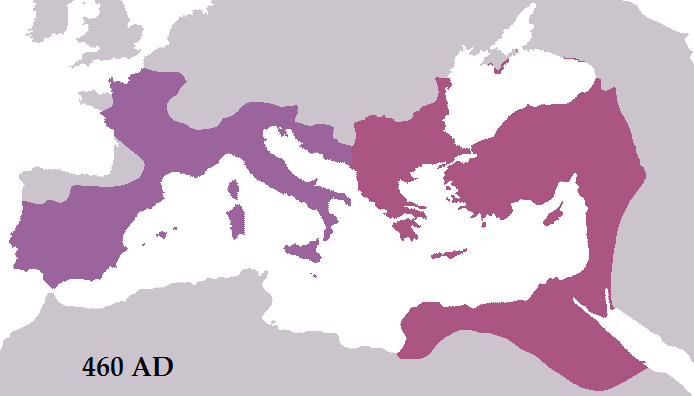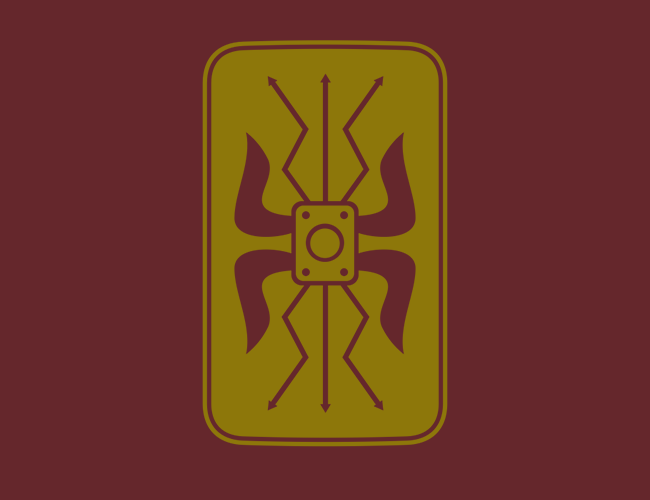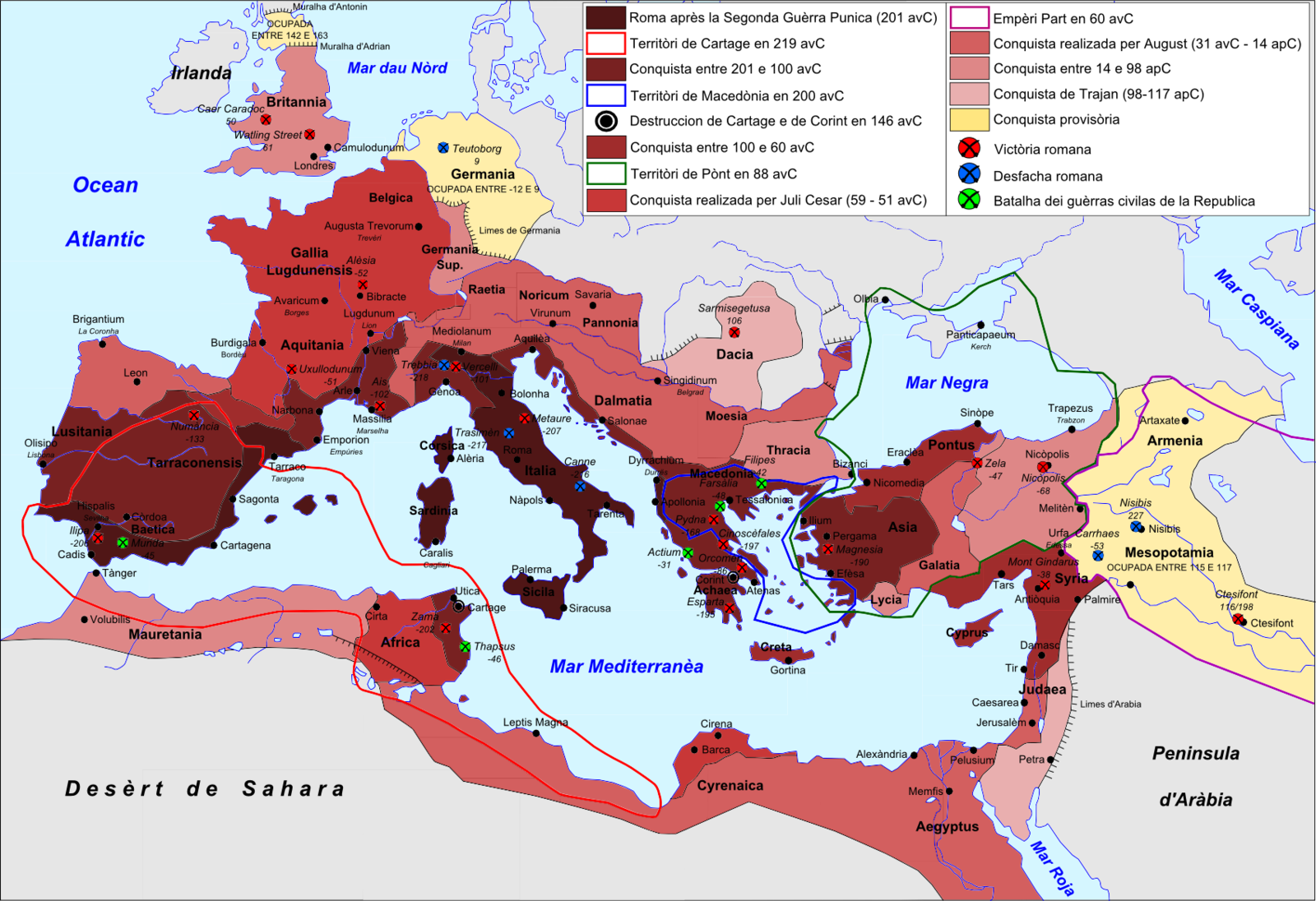Pax Romana Magika | Римский колдовской мир
Pax Romana Magicka isn't an istitution per say, it's rather a state the Roman world reached because of eight magical education centers scattered throughout the regions surrounding Mare Nostrum. These establishments trained magi for every role imaginable in the Roman Society. These were prestigious schools, and those strong enough to finish them, could always expect a lucrative position down the line.
Римский колдовской мир - это не организация как таковая, а скорее состояние контролируемой Римом части света, достигнутое благодаря восьми магическим образовательным институциям, расположенным в разных частях Средиземноморья. Там подготавливались маги на любую возможную государственную роль в римском обществе. Эти школы были престижны, и те, что достаточно сильны, чтобы их окончить, могли рассчитывать на очень высокие посты.
Structure
There were eight schools of magic, and for them, there were eight Roman magical educational facilities, each taking up a whole district of their respective city or a significant part of the province they were in. After finishing one of the schools, Roman magi usually went to the Army, with the most powerful of them quickly becoming generals or governors, and eventually - senators. Though by the most powerful we mean not those who was better casters, but those who had more weight in Roman society and had better acquaintances among the ruling classes.
Всего было восемь школ магии, и для каждой было своё магическое образовательное заведение. Эти институции занимали либо целые кварталы в своих городах, либо владели немалым куском территории в провинциях, где они располагались. Окончив одну из школ, римские маги часто уходили на службу в римскую армию. Самые могущественные из них быстро становились генералами или губернаторами и, в конце концов, уходили в Сенат. Впрочем под "могущественными" имеются ввиду не самые мощные заклинатели, но те, кто имел больше веса в римском обществе и обладал лучшими связями среди власть имущих.
Magi were quite separate from the religious castes, the latter actually being in a subservient position towards the former. Priests helped appease the pantheon and organized the communion between people and gods. But they did in for the Roman government which consisted of the magic wielding majority. The only exception was the Mortarii, the magical wielding priests which dabbled in the art of Necromancy. Here is the basic list of the Roman magical schools:
Маги и религиозные деятели были жёстко отделены друг от друга: первые де-факто управляли государством, так как были большинством в Сенате, в то время как жрецы обеспечивали связь с пантеоном по приказу этого самого государства. Единственным исключением из этого правила были Мортарии, жрецы, что были посвящены в искусство некромантии. Вашему вниманию представляется лист магических школ Древнего Рима:
Illyrian Custodia - Abjuration
Иллирийская Кустодия - Ограждение
Illyria is the stretch of coastline between Greece and Italy, currently populated by South Slavic peoples such as Croatians, Serbs, Bosnians et cetera. The Custodii lived in the city of Epidaurum. At some point they were the city, since it was inhabited mostly by the magi, their families, their servants and slaves. These spellcasters favored the school of Abjuration. The most studious graduates of the Custodii were usually sent to the toughest border assignments, be it governance or protection. During the III century crisis, most emperors were the alumni of this Illyrian school.
Иллирия - это территория по берегу Адриатического моря. Она соединяет Балканский и Аппенинский полуостровы. Ныне регион населён южными славянами - хорватами, сербами, босняками и так далее. Кустодии жили в городе Эпидавр. В какой-то момент они стали этим городом: его единственными жителями были маги, их семьи, слуги и рабы. Кустодии предпочитали школу Ограждения. Её отличники по выпуску отправлялись на самые сложные посты на пограничье для его защиты или управления им. Во время Кризиса 3 века большинство императоров происходило именно из Кустодии.
Syracusan Elicii - Evocation
Сиракузские Элиции - Воплощение
Living in one of the most prosperous ports of Roman Empire, Elicii never had a need to actually hunt for material components, they had it all brought to them. Partly because of their unique disposition, they were really good at mercantile exploits. The other part of their commercial success was their aptitude in the school of Evocation, and one does want to close a deal as fast as they can if they're being threatened by a Fireball.
Проживая в одном из самых богатых портов Римской империи, Элициям никогда особо не требовалось добывать материальные компоненты для заклинаний, их всегда привозили к ним. Частично из-за этого уникального положения, представители этой школы магии были отличными торговцами. Частично их коммерческому успеху также способствовало то, что их партнёры были рады как можно быстрее закрывать сделки, потому что иначе им начинали угрожать Огненными шарами.
Gadesian Convertarii - Transmutation
Гадезийские Конвертарии - Трансмутация
One of the oldest cities of Europe Gades, also known as Gadir or Cadiz, hosted the youngest school of Convertarii. Resisting against the Carthagenians during the Punic Wars, Gadesians became allies of Rome. After Caesar's success in Gallia and his Iberian victories against Pompei's forces, the city celebrated by building an area specifically for the magi. Convertarii practiced the school of Transmutation, and they have helped the development of this city immensely.
Один из старейших городов Европы Гадез, также известный как Гадир и Кадис, содержал в себе самую молодую из римских магических школ - Конвертарию. Поселение заслужило дружбу и уважение Рима после того, как сопротивлялось карфагенцам во время Пунических войн. В 1 веке до нашей эры, после успехов Цезаря в Галлии и его побед против верных Помпею римлян в Иберии, город отпраздновал эти события постройкой целого квартала для волшебников. Конвертарии практиковали школу Трансмутации, и их способность превращать одно в другое сильно помогло развитию Кадиса.
Catalaunian Illecebria - Enchantment
Иллецебрия Каталунская - Очарование
The Cataulunian fields, later known as a part of Loire river valley in France, were home to Roman enchanters. This kind of magic came from the Elves way before The Great Roman Purge happened. Before Caesar's Gallic campaigns, this area was populated by druids who had their Roman pupils that pretended they wanted to know more about Elven way of life. But as soon as the Legions appeared on the horizon, they betrayed their masters. After the war, Illecebrians established control over a huge area of land many later called "The Enchanted Forest". Legends among the commoners told about numerous passions and temptations that waited those who wandered into these forests. Useful legends that provided a lot of cannon fodder for the Roman enchanters.
Каталунские поля, позднее известные как часть долины реки Луара во Франции, были домом римских чаровников. Эта магия изначально пришла от эльфов, практиковалась задолго до Великой Римской Чистки. До галльской кампании Цезаря эти земли были населены друидами, у которых учились некоторые римляне, якобы желая познать эльфийский образ жизни. Однако стоило легионам появиться на горизонте, эти самые ученики предали своих учителей. После войны Иллецебрии взяли под контроль огромную площадь в долине и часть прилегающих лесов, которые позднее стали называть "Зачарованным лесом". Легенды простолюдинов рассказывали о страстях и искушениях, что ждут случайно забредших на эти земли. Очень полезные легенды, много тренировочных целей для римских чаровников они принесли.
Delphian Auguri - Divination
Авгуры Дельфийские - Ясновидение
Magi with the gift of premonition were always very valuable for the Romans. This is the reason Delphi managed to acclimate to the Roman way of life way faster than other Greek city-states. They didn't even need to change something, they already had their Oracle. The only thing that truly changed was the group that controlled Delphi: mages instead of priests. Armed with foreknowledge thanks to Divination magic, Auguri were ones of the best field generals Rome ever produced.
Маги с даром предвидения всегда уважались и ценились римлянами. Поэтому Дельфы так легко и встроились в новый мировой порядок, в отличие от других греческих полисов. Дельфийцам даже не надо было ничего менять, у них же уже был свой Оракул. Единственно что действительно изменилось, так это контролирующая город группа: волшебники возглавили его взамен жрецов. Вооружённые чувством будущего благодаря магии Ясновидения, Авгуры были, наверное, лучшими римскими генералами в истории.
Urbii of Rome - Conjuration
Римские Урбии - Созидание
Creating power out of nothing was a Roman motto before the term "motto" even existed. This is what Urbii were about: they've studied the school of Conjuration that basically allowed willing things into existence. It was pertinent for them to live in Rome since in the times of hunger they could at least partially cover the needs of populace with their conjured foods. They also controlled Via Omnis, the Everroad, the reason why Rome has managed to keep their lands together for so long.
Создание могущества из ничего было римским коронным приёмом ещё до того, как слово "приём" вообще существовало в этим смысле. Этим и занимались Урбии - изучая школу Созидания, они буквально своей волей могли заставить существовать вещи, которые не существовали ранее. Уместно было то, что они обитали в самой столице, ведь в голодные времена они могли хотя бы частично покрывать дефицит провизии при помощи магии. Они также контролировали Via Omnis, Вседорожье, причину того, почему Риму удалось так долго удерживать завоёванные земли.
Alexandrian Mendaxii - Illusion
Александрийские Мендаксии - Иллюзии
During Octavian's reign, those who practiced the school of Illusion moved to Egypt. Their base of operations was actually the Library of Alexandria, but they also had a stronghold in the form of an ancient Egyptian, possibly even Serpentite temple in Upper Egypt, near the deserts. There Mendaxii learned discerning mirages from reality so they could have more control over their own illusions and more understanding of how the others perceive them.
Во время правления Октавия Августа те, что практиковали школу Иллюзии, переехали в Египет. Они поселились в Александрийской библиотеке. В их владениях также был старый, возможно даже серпентитский храм в Верхнем Египте, на границе с пустыней. Там Мендаксии учились отличать миражи от реальности, чтобы впоследствии иметь больше контроля над их собственными иллюзиями и понимать, как их видят другие.
Mortarii of Asia Minor - Necromancy
Мортарии Малой Азии - Некромантия
In the Cappadocian Caves there were numerous ancient resting places since before the Bronze Age. Meditations there allowed the Mortarii to understand the nature of death and how to reverse it. This priestly order was so revered, it was actually considered equal to Magi. They spent more time on training than their counterparts, but every legion rejoiced if a new contigent of Mortarii joined them, since there spellcasters had the ability to bring back to life up to twenty soldiers in the ten-day period after a battle.
В пещерах Каппадокии расположено множество древних захоронений времён ещё до Бронзового века. Мортарии любили медитировать там, познавая истину о смерти и о том, как её избежать. Этот орден жрецов был настолько почитаем, что их даже считали равными магам. Они тратили намного больше времени на подготовку чем их товарищи, но каждый легион ликовал, стоило его солдатам узнать о том, что к ним присоединятся Мортарии, ведь они были способны возвращать к жизни до двадцати воинов за десять дней после битвы.
Culture
Once a decade on the Ides of March all Roman Magi gathered in the capital for a huge celebration of Republican, later Imperial might. New spells were showcased, more people were promised to be given to the schools, epic magical duels happened, all to uphold to the tradition of "bread and circuses". The schools were quite competitive between each other, though, sometimes even to the point of animosity and intrigue, even murder. This is why before the Ist century AD they were put as far away from each other as possible.
Раз в десять лет на Мартовские Иды все римские маги собирались в столице на крупное празднование, посвящённое мощи Республики, а потом и Империи. Показывались новые заклинания, школы рекрутировали молодых людей или брали обещания с родителей о том, что их дети будут отправлены тем или иным волшебникам, происходили магические дуэли - всё ради поддержания традиции "хлеба и зрелищ". Школы вообще достаточно сильно соревновались и частенько ненавидели друг друга. Доходило до открытых противостояний, интриг и даже убийств. Именно поэтому к 1 веку Нашей эры их расселили как можно дальше друг от друга.
Assets
The main asset of Roman Magi were their Signature Spells, magical incantations that brought them power, glory and respect of Roman citizens. Only the strongest of spellcasters, those who were able to achieve power of Classical Magic could cast those. Each spell had specific, mostly military, use.
Основным сокровищем римских магов были их "фирменные" заклинания, магические заговоры что принесли им могущество, славу и уважение граждан. Лишь самые сильные заклинатели, что достигали ступени Классической магии, могли их сотворять. У каждого заклинания были свои применения, в основном военные.
Planar Binding
Планарные Узы
Abjurers of Illyria were masters of monsters. Summoning the most vile creatures from other religions' mythologies, they bound them to Earth and set them loose in the lands of enemies of Rome. This was one of the earliest cases of psychological warfare: numerous barbarians lost any will to fight when they saw creatures from their bedtime stories come to life and ransack their country. Custodii were also experimentators: they used to change these monsters with magic to make them more vile and atrocious.
Колдуны из Иллирии были хозяевами множества монстров, призывая их с далёких планов, связанных с верованиями тех или иных варваров-противников Рима. Кустодии привязывали этих тварей к Земле и отпускали на территории своих врагов. Это один из самых ранних приёмов психологического давления на поле боя: не у каждого воина оставалось желание сражаться, когда он видел как существа из сказок, что он слышал в детстве, уничтожают всё на своём пути в его родных землях.
Dawn
Заря
Romans started using more archers by the end of Classical age, but for those elite archery units used in various campaigns, there were also Evokers that complemented them not as providers of additional firepower, but playing supportive roles. Assuming control over tactically beneficial positions such as hills, archer battalions deployed there at night and got ready for their Elicii's move. In the middle of the darkness there was suddenly a small area of sunlight. It helped archers find their targets, and a volley of arrows fell upon unsuspecting enemies while they were asleep in their camps.
Хоть римляне стали чаще пользоваться лучниками уже к концу Классической эпохи, были элитные отряды, которые неизменно дополнялись магами из Сиракуз, которые выполняли роль не дополнительной огневой мощи, но поддержки. Ночью стрелки занимали какую-нибудь тактически-выгодную позицию, например холм, и ожидали заклинания их мага. Вдруг столб света озарял кромешную тьму, и лучникам становилось легче найти свои цели, низвергая на не ожидающих этого противников, спящих в своих лагерях, целый град стрел.
Telekinesis
Телекинез
This signature spell actually rarely had a military use. Instead, Roman Convertarii worked in docks, helping assembling ships. Between the Second and the Third Punic Wars the Republic lacked naval power compared to the Carthaginians, and that was the moment where Transmuters could shine. They've helped create one of the most significant fleets of Roman history. Telekinesis was also used to build roads, temples and other types of buildings, mostly defensive ones.
Это заклинание было одним из немногих, что реже всего использовалось в бою. Вместо этого римские конвертарии работали в доках, помогая собирать корабли. Между второй и третьей Пуническими войнами у Республики практически не было флота для противостояния Карфагену, и это был момент, когда маги этой школы могли показать себя. Они помогли создать один из самых важных флотов в истории Рима. Телекинезис также использовался для строительства дорог, храмов и иных сооружений, преимущественно оборонительных.
Dominate Person
Подчинение личности
Enchanters were quite adept politically, and they were perfect spies. Hiding behind some barbarian chieftains' thrones, they whispered and corrupted their minds, dominating them with Roman goals, Roman agenda. The spell contributed a lot towards the conquests, and was also used in numerous Roman civil wars.
Владеющие школой Очарования были хорошими политиками и прекрасными шпионами. Прячась за спинками тронов варварских вождей, эти маги нашёптывали им, отравляли их разумы интересами Рима. Это заклинание не только помогло в бесчисленных завоеваниях, но также часто применялось во время многих римских гражданских войн.
Telepathic Bond
Ментальная связь
This was, without any doubt, one of two fundamental spells in Roman arsenal. The more powerful Auguri there was, the stronger an army could be. One spellcaster created a bond with seven legionnaries. This Auguri remained at a position where they could see what is happening and issue orders they themselves got via another telepathic bond. This chain of bonded spellcasters went up to the General, also an Auguri. Using this spell allowed Romans percieve the battlefield from all perspectives and act swiftly, without the delay that usually happens after the orders were issued during combat. There weren't enough Auguri to sustain bonds all over 10 thousand strong armies, but the generals made sure the spell would be cast on every battlefield veteran.
Без сомнений, одно из самых фундаментальных заклинаний в арсенале Рима. Чем сильнее Авгур, тем лучше была скоординирована армия. Один заклинатель связывал ментальными узами себя с семью легионерами. Маг находился на позиции, где мог видеть происходящие события и передавать приказы, которые они сами получили через подобную связь. Вся цепочка повязанных друг с другом мыслями колдунов шла вплоть до генерала, тоже одного из Авгуров. Используя это заклинание, римляне могли обозревать поле боя со всех возможных перспектив и действовать быстро, передавая приказы без задержек. На целые десятитысячные армии заклинателей, конечно, не хватало, но все боевые ветераны всегда находились в состоянии коммуникации со своими командирами.
Teleportation circle
Круг телепортации
It is widely known that Romans excelled at building roads. But it doesn't only mean physical roads as we know them, but magical paths as well. This is another fundamental spell which helped to link the most remote areas to Rome, Ravenna and Constantinople at some point. The Everroad, the renowned net of static portals was used to transport units and provisions, that let the governors report to the Senate on a weekly basis, was created and sustained by the conjurers. One of the main issues of governance in history was the problem of center not knowing what is happenning on borders. Via Omnis eliminated this issue. The spell consumes a lot of energy and resources, it's not cheap - setting up a portal like this one, but as soon as a teleportation circle appeared somewhere, those who lived there knew: the Romans came to stay.
Общеизвестно, что римляне были доками в постройке дорог. Но речь не только о дорогах физических, но и магических путях. Второе фундаментальное заклинание римлян позволило соединить самые отдалённые регионы с Римом, Равенной и Константинополем в различные периоды времени. Вседорожье было сетью статичных порталов, используемых для транспортировки солдат и провизии, и позволяло правителям удалённых местностей еженедельно отчитываться лично перед Сенатом. Эти "дороги" создали маги-Урбии. Одной из главных проблем управления в истории было то, что центр не знал, что происходит на границах. Вседорожье устроняло эту проблему. Да, заклинание требовало многих ресурсов и энергии, оно не было дешёвым, но как только где-то появлялся круг телепортации, жившие в той местности знали: римляне пришли туда надолго.
Seeming
Притворство
Ever heard about Roman ambushes, special units that were left in a forest to wait for the occasion they could be summoned to strike a killing blow? Seeming allowes Romans to do it even before they knew there will be a battle. Mendaxii could make it so whole cohorts seemed to actually be barbarian warriors. Then they just joined the enemies' formations and struck when they were least expected.
Слыхали ли вы когда-то о римских засадах, с отрядами, что прятались в лесу и ждали оказии, приказа нападать, чтобы нанести сокрушительный удар по врагам? Данное заклинание позволяло Мендаксиям создать иллюзию, что целые римские когорты на самом деле были варварскими отрядами. Смешавшись с рядами противника, римляне ждали самого подходящего момента и ударяли противников оттуда, откуда никакой атаки не ожидалось: изнутри.
Raise Dead
Воскрешение
As previously mentioned, Mortarii were clerics, not wizards or sorcerers, but they were regarded as such. They rarely participated in fighting and prefered to stay behind, healing solders that were brought to them and bringing the commanders and mages back to life with this spell. With Mortarii attached to the armies, the Romans almost never lost their officer corps during campaigns, which greatly contributed to morale and overall success of the operations.
Как упоминалось ранее, мортарии были клериками, а не волшебниками или чародеями, но их считали магами. Они почти не участвовали в боях и предпочитали держаться позади, исцеляя приносимых им бойцов и возвращая к жизни командиров и заклинателей при помощи "Воскрешения". Римляне практически никогда не теряли командиров в боях, если в армии были мортарии, что позволяло укреплять мораль солдат и сильно влияло на успех операций.
Disbandment
All good things (at least to the Romans) had to come to an end. With the decay of the fifth stage of magical power, the one that provided all those oh-so-useful Signature Spells, the schools started decaying as well. Some went out in a blaze of glory, the others just decomposed like fallen soldiers left on the battlefield.
Всё хорошее (по крайней мере, для римлян) заканчивается. С утечкой пятой ступени магической мощи, той самой, к которой принадлежали все перечисленные "фирменные" заклинания, сами школы также начали постепенно угасать. Некоторые погибли в сиянии славы, иные же просто остались разлагаться, как забытые тела павших на поле боя.
Monsters and breadcrums
Монстры и хлебные крошки
During the Crisis of Third Century the Abjurers started producing more different hellish monsters, even tapping into Christian mythologies, summoning demons and binding them to Illyria and Pannonia. After the Western Roman Empire fell the number of these abominations has risen even higher, because the Magi believed they could distract the barbarians with them. All this time, the mosters themselves migrated north in spades, which was also fine for the Custodii, since they stopped being their own problems. What they didn't know, is that on the plains of Eastern Europe there lived people that didn't like this influx of creatures from nightmares. They had decades to become experts in monster hunting, and they really wanted to learn what was the source of them. In the VI century the Illyrians that lost their power of summoning already forgot they've prompted these migrations some three-odd hundred years ago... And then the Slavs arrived. Accustomed to fighting monsters they quickly came to realize that the Custodii were the ones who summoned them, and quickly dispatched these Roman mages, taking their lands and settling there.
Во время кризиса Третьего века маги ограждения начали производить всё больше различных адских монстров, используя теперь даже христианскую мифологию и призывая даже демонов, привязывая их к Земле в Иллирии и Паннонии. После падения Рима этих тварей стало ещё больше: Кустодии боялись, что варвары примутся за них, и решили таким образом их отвлечь. Монстры также самостоятельно массово мигрировали на север, что, в принципе, тоже устраивало магов, теперь это переставало быть возможной проблемой. Вот чего Кустодии не знали, так это того, что на равнинах Восточной Европы жили-поживали люди, которым этот наплыв кошмарных существ не очень-то и понравился. За десятки лет эти народы поднаторели в охоте на монстров и очень-то уж захотели найти источник этих ужасных миграций. И вот, к 6 веку, когда иллирийцы уже не могли призывать никаких существ да позабыли свои деяния трёхвековой давности, из-за горизонта прибыли славяне. Привычные к охоте на монстров, они быстро разобрались, что к чему, и вырезали римских магов подчистую, забрав их земли себе.
Betrayed by Rome
Преданные Римом
Syracuse were in Roman or, well, Byzantine hands until it was conquered by the Caliphate in 878 AD. The Muslims had mages of their own, and they countered any Roman attempts of blowing up their ships, tactics that worked fifty years before that. The defeated Elicii ran away to Rome, but at the time Christian persecutions of magical spellcaters were on the rise. Under orders of the Pontiff, the remaining Evokers were either executed or enslaved.
Сиракузы оставались в руках римлян, или, надо сказать, византийцев вплоть до завоевания мусульманами в 878 году Нашей эры. У Халифата были свои маги, и они легко отразили попытки Элициев уничтожить корабли захватчиков. Побеждённые, волшебники сбежали в Рим, но к тому моменту христиане уже вовсю преследовали творцов заклинаний. По приказу Папы оставшиеся в живых маги были либо уничтожены, либо порабощены.
The Converted and The Resistant
Обращённые и Стойкие
First to fall to the Arabs was Alexandria. The Mendaxii chose to oppose the invaders, even though under Byzantine rule they faced more and more restrictions every day due to Christian demands. Muslims respected the choice of the illusionists and burned them while they stood their ground inside their precious Library of Alexandria. Though when Cadiz fell to Muslim invaders, the Transmuters just converted to Islam and transitioned into a new state where they could be useful again.
Во время арабских завоеваний из городов магов первой пала Александрия. Мендаксии решили дать захватчикам отпор несмотря на то, что под властью византийцев они с каждым днём всё больше и больше становились ограниченными желаниями христианской Церкви. Мусульмане с уважением отнеслись к выбору иллюзионистов и просто сожгли их вместе с Александрийской Библиотекой. А вот когда захватчики добрались до Кадиса, маги Трансмутации просто обратились в ислам и продолжили жить в новой стране, где они снова могли быть полезны.
Razed by the Huns
Разорённые Гуннами
The Cataulunian fields became the battlefield between Romans and the Huns, nomadic invaders from the East with orcs, goblins and hobgoblings among them. For Romans, it was hard to enchant goblins, since there were a lot of them and they easily dispatched their own at the first sign of disobedience. Ten days before the battle Huns set the Enchanted Forest ablaze and murdered every single Magi that came out running.
Каталунские поля стали полем боя между гуннами и римлянами. Кочевые гунны привели с собой невиданных нелюдей - орков, хобгоблинов, гоблинов. Римлянам оказалось тяжело справиться именно с последними: их было много и они легко убивали своих при первых признаках неповиновения. За десять дней до битвы на Каталунских полях гунны подожгли Зачарованный Лес и растерзали каждого мага, что выбегал оттуда, пытаясь спастись.
The Holdouts
Продержавшиеся
The Auguri managed to hold out up until XI century. In Byzantium, mages weren't as powerful as they were in Roman Empire, but they were still nobles. Nobody dared persecuting them, not even the Church, though there were laws that prevented indiscriminate use of magic. Spellcasters and Christians found some kind of rapport over the years. The Auguri left Delphi because of too many Pagan history that linked them to the place. Now they lived rather peacefully on Balkans, closer to the Adriatic coast, until the Normans came. Emperor Alexios Comnenos tried to rescue them, but by the time he arrived to Albania, zealous Norman knights and raiders have already dispatched the mages. They were avenged, to an extent, but nobody really shed that many tears over their demise. Unfortunately, the Byzantines soon learned that having their own soothsayers could be beneficial since they did not anticipate the fall of Constantinople to the Latin Crusaders in 1204.
Авгуры смогли продержаться аж до 11 века. В Византии они не были уже настолько могущественными как в Риме, но они всё ещё были высокородными. Никто не смел поднимать на них руку, даже Церковь, хоть и существовали уже некоторые законы, что предотвращали слишком вольное пользование магией. Заклинатели и христиане нашли общий язык в Византии. Авгурам, правда, пришлось покинуть Дельфы, так как слишком много языческой истории связывало их с этой местностью. Теперь ясновидцы жили на берегу Адриатического Моря на Балканах. Пока не прибыли норманны. Император Алексей Комнин пытался спасти их, но прибыл в Албанию слишком поздно: фанатики-рыцари уже казнили магов. За них, конечно, как-то да отомстили, но не сильно страдали потом из-за их потери. А зря: византийцы вскорости узнали, что ясновидцы им очень пригодились бы в 1204 году, когда Константинополь попал в руки крестоносцев-латинян.
Sad Demise
Печальная гибель
In the year 601 the last Urbii that knew how to sustain Via Omnis, died. At the time almost nobody used it, since the portals in Ravenna and Rome were already destroyed. For common magi casting Teleportation Circle was already an impossible task, and the last spellcaster of the Everroad, before his death, was repeatedly denied in his requests of human sacrifice to keep the portals going. That was the end of the best solution to the problem of overexpansion in history. And just mere 40 years later Egypt fell completely to the Muslims, with Byzantines having no options to send reinforcements to their "bread basket".
В 601 году последний Урбий, который знал как поддерживать работу Виа Омнис, погиб. К тому вовремени практически никто не пользовался уже этой сетью, так как порталы в Равенне и Риме уже были разрушены. Для обычных магов работа с Телепортационным Кругом уже стала непосильной задачей, а последний заклинатель что знал, как это делать, ещё до своей смерти постоянно получал отказы на его прошения о человеческих жертвоприношениях, которые помогли бы поддерживать порталы. Так и пришёл конец и школе Созидателей, и лучшему решению проблемы сверхрасширения в истории. А всего через каких-то жалких 40 лет Египет пал, был завоёван мусульманами в момент, когда у византийцев просто не было возможности послать подкрепления в свою "житницу".
The Forgotten
Забытые
Nobody knows what happened to Mortarii. Some say that with the adoption of Christianity, they just packed up their things in Cappadocia and left somewhere. According to some sources, they were noticed to the south, in Mesopotamia, boarding ships. The other sources claim they went East, across the Caspian Sea and through the Great Steppe. There are no accounts about what the Necromancers did next.
Никто не знает, что на самом деле случилось с Мортариями. Кто-то считает, что с принятием Христианства они просто собрали свои вещи и покинули Каппадокию. Согласно некоторым источникам, их видели совершающими посадку на корабли где-то в Месопотамии. Иные утверждают, что они двинулись на восток, через Каспийское море и Великую Степь. Но никто не знает, что некроманты планировали делать дальше и куда они делись.
DISBANDED/DISSOLVED
500 BC - 601 AD
Type
Education, Magic
Training Level
Elite
Veterancy Level
Decorated/Honored












Beautiful stuff! Love a good long read, especially when its interesting!
Thank you! Worked on it whole day, though the article needs some garnish, of course. Two columns of text could be exhausting to scroll through ;)